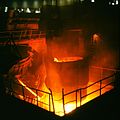Puerto Rico Iron Works
| Company type | Private |
|---|---|
| Industry | iron foundry |
| Founded | Ponce, Puerto Rico (1919) |
| Headquarters | Ponce, Puerto Rico |
Key people | Antonio Ferre, Luis A. Ferre |
| Products | manhole covers, rail tracks |
Puerto Rico Iron Works (founded as Porto Rico Iron Works) was a heavy industry iron foundry located in barrio La Playa in Ponce, Puerto Rico. The company was founded in 1918.[1] The foundry "was Puerto Rico's most prolific steel bridge fabricator in the 20th Century"[2] and the largest iron foundry in the Antilles.[3]
History

Puerto Rico Iron Works (PRIW) was founded by Antonio Ferré Bacallao,[4] an 1896 immigrant from Cuba, whose father was a French engineer that had worked in the construction of the Panama Canal.[5] Antonio Ferré's family would become one of the most legendary families in Puerto Rico: one of his sons, Luis Antonio Ferré became governor of the Island from 1969 to 1973, and one of his daughters, Isolina Ferré, known as The Mother Teresa of Puerto Rico, received the Presidential Medal of Freedom from President Bill Clinton in 1999 for her outstanding role in community activities, including the founding of a small hospital and school in Playa de Ponce next to the iron foundry called Centro de Orientacion y Servicios.
Antonio Ferre founded Puerto Rico Iron Works after experience he had garnished from his short employnment experience at Puerto Rico's first iron foundry Sobrinos de Portilla Foundry in San Juan.[6] After learning that his uncle, Luis Bacallao, had settled in Ponce, Antonio Ferre moved to Ponce where his family would establish roots.[7]
Son Luis Ferre helped transform Antonio's Puerto Rico Iron Works into a highly successful business after returning to Puerto Rico in 1925, having himself completed a degree in mechanical engineering from MIT.[8] Luis recruited some very bright talent for the company, including Raúl G. Villaronga, the company's accountant who would later become the first Puerto Rican mayor of a Texas city.
Foundry works
The company first started doing business for Puerto Rican sugar and coffee plantations, in the area of irrigation systems and railroad track and wagon systems to carry products between plantations in the south. It also developed machinery for the crushing of sugar cane at sugar cane mills.[9] Almost all of the railroad tracks laid in Puerto Rico in the early decades of the 20th century originated from PRIW. In the first half of the 20th century, the company was heavily involved in the production of iron-based bridges to address Puerto Rico's need for bridges[10] The foundry was located just a few blocks away from the Port of Ponce docks, making the company one within easy reach for vessels requiring repairs as well. In the second half of the century the company was into the manufacturing of a number of specialty items such as manhole covers.
Social inclination
Puerto Rico Iron Works, under Luis Ferre's leadership, was the first company doing business in Puerto Rico to implement several labor measures that would not be adopted by the Puerto Rico Legislature until decades later, among them the institution of a Christmas bonus for employees to supplement the cost-of-living increases during financially difficult times; and the incorporation of a pension fund.[11] The company was also the first to provide aid to families in case of a worker’s incapacity or death.[12] The company also implemented a minimum wage "law" of its own and an 8-hour labor day "before US law enforced those ideas."[13]
External links
References
- ^ Foundation year
- ^ Builder and Designer of Bridge Structures "BATEY COLUMBIA RAILROAD BRIDGE - Spanning the Maunabo River" (Barrio Calzada, Maunabo, PR), In "HISTORIC AMERICAN ENGINEERING RECORD". By National Park Service, Southeast Region, Department of the Interior. Atlanta, Georgia 30303. Page 6 Retrieved November 18, 2009.
- ^ National Register of Historic Places Registration Form: Edificio Empresas Ferre, a.k.a., Centros Isolina Ferre. Juan Llanes Santos, Historian. Puerto Rico State Historic Preservation Office. 19 June 2013. San Juan, Puerto Rico. National Register of Historic Places. ID # 13000638. Page 7. Retrieved 27 November 2013.
- ^ Puerto Rico Grieves Over The Loss Of Its Premier Statesman Four Months Short Of His 100th Birthday: Luis A. Ferre Aguayo (1904-2003). Marialba Martinez. Puerto Rico Herald. Caribbean Business section. October 30, 2003. Retrieved 26 October 2011.
- ^ "Luis Ferré, former governor and Corporation member". Massachusetts Institute of Technology. 2003-10-29. Retrieved 2009-11-18.
- ^ Sobrinos de Portilla
- ^ Moved to Ponce
- ^ "Former Puerto Rican Gov. Luis A. Ferré dies". The Miami Herald. 2003-10-22. Retrieved 2009-11-08.
- ^ Railroad tracks
- ^ Builder and Designer of Bridge Structures "BATEY COLUMBIA RAILROAD BRIDGE - Spanning the Maunabo River" (Barrio Calzada, Maunabo, PR), In "HISTORIC AMERICAN ENGINEERING RECORD". By National Park Service, Southeast Region, Department of the Interior. Atlanta, Georgia 30303. Retrieved November 18, 2009.
- ^ X-mas bonus
- ^ Aid to families
- ^ Porto Rico, America's Gibraltar, Brought into War Zone by Allied Occupation of Dutch West Indies. By John Lear. St. Petersburg Times. (St. Petersburg, Florida) June 9, 1940. (Digital Page: 49, Printed Page:2) Accessed November 18, 2009.
17°58′55.92″N 66°37′12.29″W / 17.9822000°N 66.6200806°W
See also

